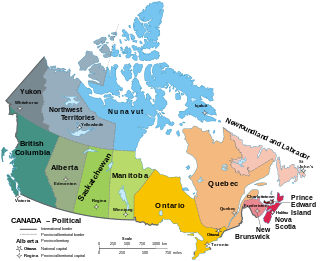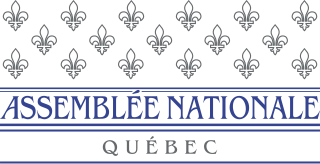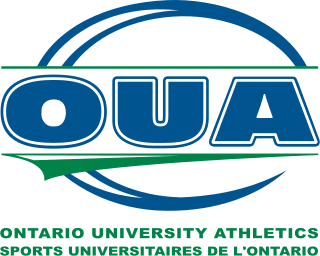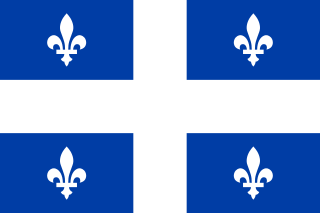
Canada has ten provinces and three territories that are sub-national administrative divisions under the jurisdiction of the Canadian Constitution. In the 1867 Canadian Confederation, three provinces of British North America—New Brunswick, Nova Scotia, and the Province of Canada —united to form a federation, becoming a fully independent country over the next century. Over its history, Canada's international borders have changed several times as it has added territories and provinces, making it the world's second-largest country by area.

Quebec City, officially Québec, is the capital city of the Canadian province of Quebec. As of July 2021, the city had a population of 549,459, and the metropolitan area had a population of 839,311. It is the eleventh-largest city and the seventh-largest metropolitan area in Canada. It is also the second-largest city in the province after Montreal. It has a humid continental climate with warm summers coupled with cold and snowy winters.

Québec City Jean Lesage International Airport, also known as Jean Lesage International Airport, is the primary airport serving Quebec City, Canada. Designated as an international airport by Transport Canada, it is located eleven kilometres west-southwest of the city. In 2021 it was the 15th-busiest airport in Canada, with 353,203 passengers. More than 10 airlines offer 360 weekly flights to destinations across Canada, the United States, Central America, Mexico, the Caribbean and Europe.
The politics of Quebec are centred on a provincial government resembling that of the other Canadian provinces, namely a constitutional monarchy and parliamentary democracy. The capital of Quebec is Quebec City, where the Lieutenant Governor, Premier, the legislature, and cabinet reside.

The National Assembly of Quebec is the legislative body of the province of Quebec in Canada. Legislators are called MNAs. The King in Right of Quebec, represented by the Lieutenant Governor of Quebec and the National Assembly compose the Legislature of Quebec, which operates in a fashion similar to those of other Westminster-style parliamentary systems. The assembly has 125 members elected first past the post from single-member districts.

The Canada Games is a multi-sport event held every two years, alternating between the Canada Winter Games and the Canada Summer Games. They represent the highest level of national competition for Canadian athletes. Two separate programs are organized in order to cover the seasons of summer and winter: the Canada Summer Games (CSG) and the Canada Winter Games (CWG).

Rugby Canada is the national governing body for the sport of rugby union in Canada. Rugby Canada was incorporated in 1974, and stems from the Canadian Rugby Football Union, a body established in 1884 that now governs amateur Canadian football as Football Canada; and the now-defunct Rugby Union of Canada, established in 1929. Rugby Canada administers the Canada national rugby union team and sanctions the Rugby Canada National Junior Championship, a national competition for under-20 men's teams. It previously sanctioned the Super League as the premier level of men's competition in the country, but scrapped that league after the Americas Rugby Championship was created in 2009 as a two-stage competition in which the first involved only Canadian teams.

Football Canada is the governing body for amateur gridiron football in Canada headquartered in Ottawa, Ontario. Football Canada focuses primarily its own Canadian form of the sport, and is currently the world's only national governing body for Canadian football.
The Bar of Quebec is the regulatory body for the practice of advocates in the Canadian province of Quebec and one of two legal regulatory bodies in the province. It was founded on May 30, 1849, as the Bar of Lower Canada.

Atlantic University Sport is a regional membership association for universities in Atlantic Canada which assists in co-ordinating competition between their university level athletic programs and providing contact information, schedules, results, and releases about those programs and events to the public and the media. This is similar to what would be called a college athletic conference in the United States. The AUS, which covers Canada east of the province of Quebec, is one of four such bodies that are members of the country's governing body for university athletics, U Sports. The other three regional associations coordinating university-level sports in Canada are Ontario University Athletics (OUA), the Canada West Universities Athletic Association (CW), and the Réseau du sport étudiant du Québec (RSEQ).

The Society of Graphic Designers of Canada (GDC) is Canadaʼs national certification body for graphic and communication design and since 1956 has established standards for design professionals, educators, and leaders. GDC licenses and certifies members whose services the standardized criteria. GDC was Canada’s first distinct group to professionalize graphic design as a distinct field.

Ontario University Athletics is a regional membership association for Canadian universities which assists in co-ordinating competition between their university level athletic programs and providing contact information, schedules, results, and releases about those programs and events to the public and the media. This is similar to what would be called a college athletic conference in the United States. OUA, which covers Ontario, is one of four such bodies that are members of the country's governing body for university athletics, U Sports. The other three regional associations coordinating university-level sports in Canada are Atlantic University Sport (AUS), the Canada West Universities Athletic Association (CW), and Réseau du sport étudiant du Québec (RSEQ).

The Réseau du sport étudiant du Québec is the current name for the organisation formerly known as the Fédération du sport scolaire du Québec. RSEQ is the governing body of primary and secondary school, collegiate and university sport in Quebec. It also serves as a regional membership association for Canadian universities which assists in co-ordinating competition between their university level athletic programs and providing contact information, schedules, results, and releases about those programs and events to the public and the media. This is similar to what would be called a "college athletic conference" in the United States.

Quebec is one of the thirteen provinces and territories of Canada. It is the largest province by area and the second-largest by population. Much of the population lives in urban areas along the St. Lawrence River, between the most populous city, Montreal, and the provincial capital, Quebec City. Quebec is the home of the Québécois nation. Located in Central Canada, the province shares land borders with Ontario to the west, Newfoundland and Labrador to the northeast, New Brunswick to the southeast, and a coastal border with Nunavut; in the south it borders Maine, New Hampshire, Vermont, and New York in the United States.
The Government of Quebec is the body responsible for the administration of the Canadian province of Quebec. A constitutional monarchy, the Crown is the corporation sole, assuming distinct roles: the executive, as the Crown-in-Council; the legislature, as the Crown-in-Parliament; and the courts, as the Crown-on-the-Bench. The powers of the Crown are exercised on behalf of three institutions—the Executive Council (Cabinet); the National Assembly; and the judiciary, respectively.
The Commission de toponymie du Québec is the Government of Québec's public body responsible for cataloging, preserving, making official and publicize Québec's place names and their origins according to the province's toponymy rules. It also provides recommendations to the government with regard to toponymic changes.
Soccer Quebec is the governing body for soccer in the Canadian province of Quebec. The QSF is one of thirteen provincial and territorial federations members of the Canadian Soccer Association. It is headquartered in Laval.











